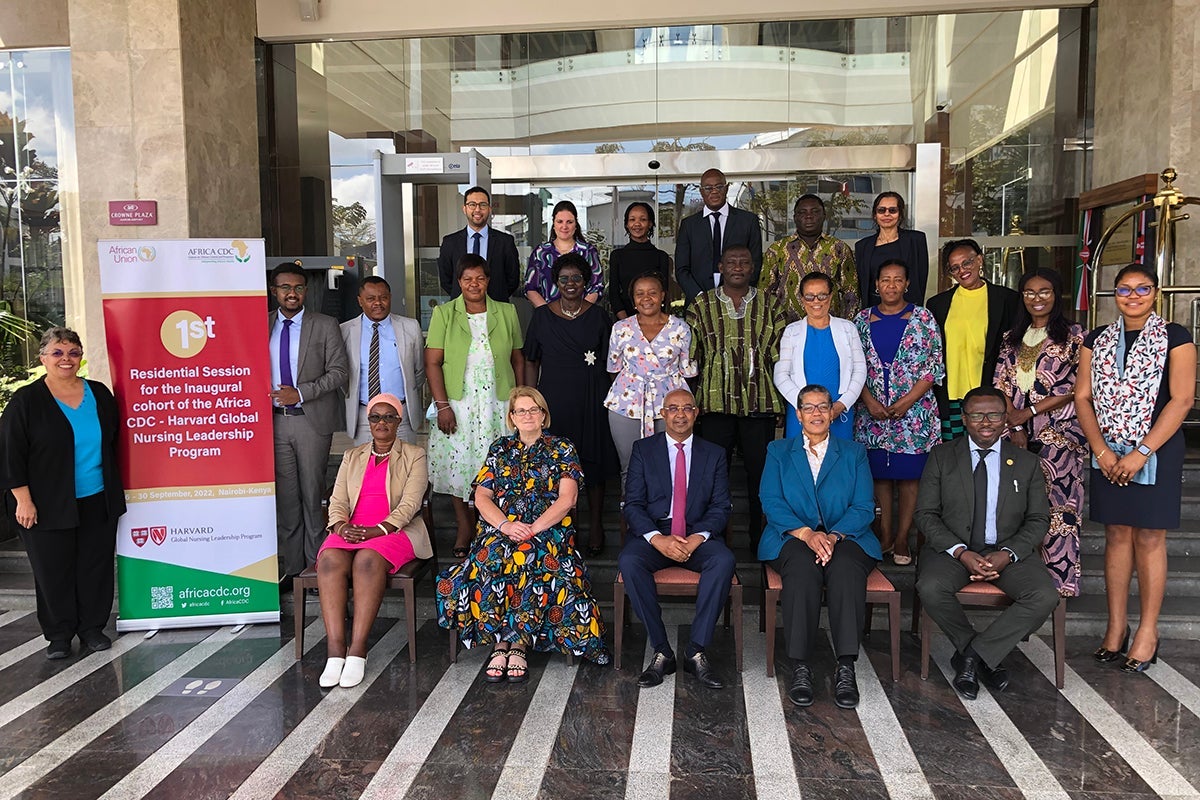African nursing leaders take deep dive into how to strengthen health systems

Inaugural cohort in Harvard Global Nursing Leadership Program convenes in Kenya for week-long training
November 16, 2022 – In late September, 14 nurses from Africa, all serving in high-level positions across the continent, gathered in Nairobi, Kenya for a week-long intensive course focused on a hefty challenge: how to transform health systems.
The group represented the first cohort of the Harvard Global Nursing Leadership Program’s Certificate in Global Public Health for Nurse Leaders. The Global Nursing Leadership Program was launched jointly last May by Harvard T.H. Chan School of Public Health, Harvard Kennedy School, and Harvard Graduate School of Education, in partnership with the African Union and the Africa Centres for Disease Control and Prevention (Africa CDC), to elevate nursing and midwifery leadership around the world. The program aims to tap into the broad knowledge and expertise of nurses—who have been on the front lines of the COVID-19 pandemic and other public health crises, and who are uniquely positioned to shape public policy around disease prevention, health promotion, and population health—and to ensure a sufficient role for nurses at the policy-making table, as well as a strong nursing workforce.
The program includes several virtual orientation sessions to familiarize the participants with Harvard and outline expectations for the program. It also includes three five-day courses. The September course, taught by Rifat Atun, professor of global health systems, focused on strengthening health systems. In February, Stephanie Ferguson, professor of the practice of health policy and management and director of the program, will teach a remote course about strategies to improve health within and across populations. In June, participants will gather in Boston for a course taught by David Benton, CEO of the National Council of State Boards of Nursing, on how to analyze and reform policies and regulations so that health systems provide better access to care and better outcomes.
Atun had planned to travel to Nairobi to teach his course but wound up teaching via video because of a positive COVID-19 test. Even so, “it was a really wonderful experience,” he said.
“The course was about thinking through the opportunities and challenges facing health systems,” said Atun. “It helped answer questions such as ‘What should I focus on? What should be the priority? What sort of innovation should we introduce?’ It also covered how to build a coalition to translate a policy innovation into practice, how to communicate with and engage stakeholders, and what the role of the leader is in introducing a strategic change in a health system.”
Participants, who came from 11 different African countries, worked in small groups to apply the frameworks learned in class to solve a particular problem in their home countries. For example, Tereza Belay, Ethiopia’s national nursing education and training coordinator, worked on a project aimed at reducing maternal mortality in Ethiopia using strategies such as boosting the skills of birth attendants at health facilities and improving health care coverage for postpartum health. Nyangi Philemon Ngomu, a registered nurse currently serving as the national professional officer for the Africa regional office of the World Health Organization, and who previously worked as a South Africa-based regional advisor for a Columbia University program on building global nursing capacity, devised a project looking at health and safety risk factors among staff at the UN office in South Africa. Other projects focused on the high mortality rate in Malawi, Lassa fever in Liberia, and the rising incidence of antimicrobial resistance in Gambia.
Mary Consolata Ishepe Nandili, director of nursing and midwifery services at Kenya’s Ministry of Health, said that one takeaway she got from the course was how to engage stakeholders. “I learned that … you need to look at their level of influence, their interest in your project, and how to convince them to support your project,” she said. “I also learned about the importance of good communication when it comes to health information. For example, in rural villages, it may not make sense to use text messages to reach people, because a lot of places don’t have internet access. But they do listen to the radio—and information on the radio can reach everyone in the community.”
Ferguson credited sponsors of the program, including the Burdett Trust for Nursing; the Pamela Dippel Choney Family, for tuition and fees scholarships; and the African Union and the Africa CDC, for providing crucial support for housing and travel. She also credited the help of program manager Michelle Bell, as well two teaching fellows from Harvard’s Health Systems Innovation Lab, which is led by Atun: lead fellow Che Reddy, associate director of the lab; and Kwabena Lartey, research associate. The support of Dean Michelle Williams—who helped propel the creation of the program and was on hand throughout the week in Nairobi—was also invaluable, Ferguson said.
As for the participants, Ferguson said she found them to be “extraordinarily engaged,” adding, “What I want nurses and midwives to do is to think big. Start by thinking local, then expand to think about your region, the African continent, the world. We’re not going to be able to shift what we do in public health and improve population health outcomes worldwide if we don’t have leaders who think big.”
Photos courtesy Stephanie Ferguson


